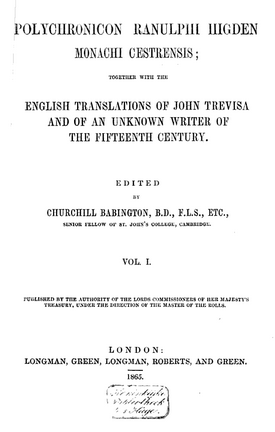John Trevisa | |
|---|---|
| Born | John Trevisa 1342 Trevessa, St. Enoder parish, England |
| Died | 1402 |
| Occupation(s) | Theologian, writer, translator, vicar and canon |
| Employer | Queen's College, Oxford |

John Trevisa (or John of Trevisa; Latin: Ioannes Trevisa; fl. 1342–1402 AD) was a Cornish writer and professional translator.
Trevisa was born at Trevessa in the parish of St Enoder in mid-Cornwall, in Britain and was a native Cornish speaker.[1] He was educated at Exeter College, Oxford, and became Vicar of Berkeley, Gloucestershire, chaplain to the 5th Lord Berkeley, and Canon of Westbury on Trym.
He translated into English for his patron the Latin Polychronicon of Ranulf Higden,[2] adding remarks of his own, and prefacing it with a Dialogue on Translation between a Lord and a Clerk. He likewise made various other translations, including Bartholomaeus Anglicus' On the Properties of Things (De Proprietatibus Rerum), a medieval forerunner of the encyclopedia. It seems likely that he was the translator of the Bible into Cornish, a language, which until recently, was thought not to have possessed a bible translation. [3][4]
A fellow of The Queen's College, Oxford, from 1372 to 1376 at the same time as John Wycliff and Nicholas of Hereford, Trevisa may well have been one of the contributors to the Early Version of Wycliffe's Bible. The preface to the King James Version of 1611 singles him out as a translator amongst others at that time: "even in our King Richard the second's days, John Trevisa translated them [the Gospels] into English, and many English Bibles in written hand are yet to be seen that divers translated, as it is very probable, in that age". Trevisa does not seem to have been a Wycliffite or Lollard, though he had some views in common about corruption.[5]: 96
Subsequently, he translated a number of books of the Bible into French for Lord Berkeley, including a version of the Book of Revelation, which his patron had written up onto the ceiling of the chapel at Berkeley Castle. Trevisa's reputation as a writer rests principally on his translations of encyclopaedic works from Latin into English, undertaken with the support of his patron, Thomas (IV), the fifth Baron Berkeley, as a continuous programme of enlightenment for the laity.[6]
John Trevisa is the 18th most frequently cited author in the Oxford English Dictionary and the third most frequently cited source for the first evidence of a word (after Geoffrey Chaucer and the Philosophical Transactions of the Royal Society).[7]
YouTube Encyclopedic
-
1/3Views:28 1965501 932
-
Why Week: Why are Special Days Called 'Red Letter Days'?
-
Mitos y verdades: productos de la colmena: usos y potencialidades
-
Lecture 02 | The Anglo-Norman Period/ Age of Chaucer: History of English Literature | Shakir Shahzad
Transcription
References
- ^ The Cornish Language and Its Literature – Peter Berresford Ellis 1974
- ^ "Polychronicon Ranulphi Higden, Monachi Cestrensis; together with the English translation of John Trevisa, and of an unknown Writer of the Fifteenth Century edited by Rev. Joseph Rawson Lumby, Vol. III". The Athenaeum (2282): 108–109. 22 July 1871.
- ^ https://www.academia.edu/3439905/The_Cornish_Bible_of_John_Trevisa
- ^ https://bgro.repository.guildhe.ac.uk/id/eprint/855/1/Grigg_the%20cornish_2021.pdf
- ^ Fowler, David C. (1960). "John Trevisa and the English Bible". Modern Philology. 58 (2): 81–98. ISSN 0026-8232.
- ^ Oxford DNB http://www.oxforddnb.com.ep.fjernadgang.kb.dk/view/article/27722
- ^ Top 1000 sources in the OED
- David C. Fowler (1993) John Trevisa, Ashgate ISBN 0-86078-370-7
- David C. Fowler (1995) The Life and Times of John Trevisa, Medieval Scholar, Seattle: University of Washington Press ISBN 0-295-97427-3
- Eric Gethyn-Jones (1978) Trevisa of Berkeley, a Celtic Firebrand. Dursley: Alan Sutton ISBN 0-904387-20-8
External links
- John of Trevisa, Online Companion to Middle English Literature
- John Trevisa, Cambridge History of English and American Literature (1907–21) – see also the previous and following pages.
- Trevisa, John de, Dictionary of National Biography, 1899
- Jane Beal, John Trevisa and the English Polychronicon (2012) – book examining Trevisa's rhetorical strategies to establish his own authority in his Polychronicon, a universal history of the world, with additional consideration of his letter to Lord Berkeley, "Dialogue between a Lord and a Clerk," and interpolated notes as well as his other translations. The final chapter considers the reception of the English Polychronicon in the Renaissance.
- Works by John Trevisa at Project Gutenberg
- Works by or about John Trevisa at Internet Archive
 This article incorporates text from a publication now in the public domain: Cousin, John William (1910). A Short Biographical Dictionary of English Literature. London: J. M. Dent & Sons – via Wikisource.
This article incorporates text from a publication now in the public domain: Cousin, John William (1910). A Short Biographical Dictionary of English Literature. London: J. M. Dent & Sons – via Wikisource.- Digital view of Trevisa's On The Properties of Things, from the British Library
